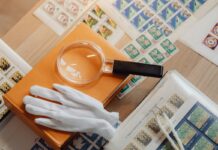Translated by Vasantha Surya
When we reached the National Store, there were no customers at all.
That was one convenient thing about Natesan’s shop. There was never a crowd. No jostling. Black, green, and red hard-boiled sweets, rubber balls, pencils, affordable pens, bottles of variously coloured ink (measured out from the bottle according to your requirement), soaps and combs (Natesan didn’t stock mirrors), lotions for before and after shaving, and for turning grey hair into black, heaps of notebooks (your choice of lined, unlined and checked): all these and many other things waited for someone to buy them. Usually, though, we were the only ones who went there and stood around.
‘Come in, come in!’ Natesan would say, smiling. It was no display of betel-stained teeth. His teeth were shining white. He didn’t have the betel-chewing habit. Cigarettes, yes. Even that was outside the shop. Drinking, dancing girls, gambling, racing, herbal ‘cures’, politics, art, language, religion- he had no fixations of any sort. It was just him and his shop. Anyone could come into his shop and buy whatever they wanted (apart from provisions, medicines and milk powder). Cash down, of course. But anybody he knew well could even get goods on credit. When we went there, though there was always the welcoming ‘Come in, come in!’, he never asked us what we wanted. He knew that usually we had no money. And he knew that if we did want anything, we would ask. Though he hadn’t read the Bible, he knew the words, ‘Ask, and ye shall be given.’
That day mischief was dancing in Natesan’s eyes, and the impish smile on his face was like colour rippling on water upon which oil has been spilt. We entered the shop, Sivaprakaasam, alone, pausing to spit into the gutter. Smilingly calling out ‘Come in, come in!’ in his usual welcoming fashion, he ducked under the counter and brought out an object, flourishing it like a magician. ‘Let’s see if you can tell me what this is,’ he asked, looking proudly at us.
This unusual behavior knocked me off balance for a moment. Before I could collect my wits and ask, ‘What is it?’ Rengan reached out and took the object. At first we saw nothing remarkable about it. I thought it was the usual sort of shop-scales, until Rengan held it up and ‘weighed’ it. Instead of a single plate on each side, one of its sides had three plates, one below the other. I could not understand it at all.
‘I’ll give you each two sweets, if you tell me what this is!’ Natesan encouraged, giving us another proud smile. Sivaprakaasam and I soon gave up. Rengan alone spent a little time examining that strange triple-decker balance and thinking about it. Maybe he still liked sweets, though he was already forty. Finally, he too said, ‘What’s this! So wonderful!’ in a bemused tone, as though he were speaking not only to Natesan but to the world in general.
Natesan was delighted. ‘Never mind! Even though you don’t know what it is, take some anyway!’ he said, putting his hand into the jar and holding out some ‘papparmint’. Rengan took two, and I took one, just to be polite. Sivaprakaasam declined. He had the ‘sugar disease’. Diabetes. He ate no sweets, no rice even.
‘Just take some, ‘pa! There is no sugar at all in such sweets!’ urged Natesan, but Sivaprakaasam was resolute and countered, ‘Take my share yourself.’
Natesan neither took his share nor Sivaprakaasam’s. Maybe he wasn’t so crazy about sweets which have no sugar in them, or maybe it was just his economical mind, thinking, why waste two paise? He scooped them up and dropped them back into the jar. And then, because we begged him, he disclosed the mystery of the triple-decker balance.
‘Supposing’, he said, ‘three customers turn up at this store and demand the same article at the very same time? Well, I just weigh it out on this gadget one single time and satisfy all of them! Saves time, saves labour! How about that for an idea?’ he asked proudly.
I’ve seen Natesan’s shop from the day he set it up. Not once have I ever seen as many as three people in it together, much less clamouring for the same article at the same time. Yet I kept my mouth shut. Why ruin his enthusiasm? Rengan couldn’t contain his surprise. ‘Our Natesan, thinking ahead like this?’ he had just exclaimed, giving vent to his emotions, when this character came to the shop.
The fellow looked neither like a sanyasi, nor like a family man. Must have been around forty. The muscles fairly bulged on his stocky body. Long, black hair sprang from his head and curled on the nape of his neck. His thick eyebrows were stuck on his forehead like hairy caterpillars. His eyes glittered like black diamonds. On his cheeks, he had hoarded two weeks of beard. Bare-chested, a scanty four-cubit veshti, carelessly gathered and tucked up, revealed his legs. Only God knew if the veshti had faded to his present dirty hue from saffron or if it had ripened to that shade from an original white. From his shoulders down to his wrists, he was liberally smeared with whitewash. On his forehead was a large kumkumam dot the size of a half-rupee coin.
His eyes emitting sparks as though they were Deepavali sparklers, this man walked into the shop and ordered, ‘A kilo of sweets, please! Quick!’ His voice rang out like a temple bell.
‘Five rupees a kilo,’ said Natesan calmly, not budging, and looking the stranger over from head to foot.
‘All right, all right, gave it quick!’ The man groped at his waist, untied a knot and brought out a five-rupee note, filthy and folded into eight. Without opening the folds, he held it out.
Natesan unhurriedly took the note from him and placed it on the counter, took out the triple-decker balance and removed two of the decks. Then he placed a kilo weight on one plate, gathered some sweets and dribbled them on the other plate, closely watching the needle as though he were measuring out gold. When he was about to put them into a paper bag, the fellow hissed, ‘No need for a bag, just put them on a piece of paper!’ his eyes leaping out like a forked snake-tongue. Grabbing the piece of Tamil newspaper in which Natesan had wrapped the papparmint, he strode briskly towards the clocktower.
Drawn by curiosity about what he would do next, Rengan, Sivaprakaasam and I hurried after him at a little distance.
The municipal clocktower stands in the centre of the town bazaar, about a hundred and fifty feet from Natesan’s shop. As it is not the kind of clock that shows the date, it is hard to tell when exactly it stopped. It always shows twelve o’clock, and twelve o’clock was what it showed then, though it was dusk, the time for lighting lamps. Around this centerpiece of our town bazaar, there is a narrow stretch of bare ground, convenient for people to stand about and chat in little groups of four. If they go a little farther away, they are sacrificed to the birds, who shower trajectories of droppings on them. It is safer near the clocktower.
Standing on the small platform beneath the clocktower, the papparmint-man was thrusting one or two sweets into the hands of everyone nearby. They stared. ‘Eat it, eat it! It’s the Lord’s gift!’ he told them, as he freely distributed the sweets from Natesan’s store to yet more people.
Within half a minute the news that a stranger was standing near the clocktower and handling out free sweets had swept over the whole bazaar. The crowd was just like that sacred verse about ‘a flood pouring into low-lying ground’ – it swelled and surged towards the clocktower. Rengan and Sivaprakaasam and I were pushed by several elbows and shoved by as many buttocks until we found ourselves at the fringe of the swarming horde. Drowning out the cawing of the crows overhead were cries of ‘Saar! Mittai, saar!’
Till that very day I had no idea that the people in our town had such a fondness for sweets. At Natesan’s store, it was only children who came once in a while to buy them. I had never seen adults stampeding and falling over themselves like this. Here were grown men, in dazzling white shirts and elegantly bordered veshtis, shirtless fellows in faded veshtis, and others in terylene banians; some with watches on their wrists, or silver wristlets, or evil-eye-repelling black threads, some with grey mustaches, some baldies…A toothless old woman who sold murukkus, and her young grandson, who acted as her agent. Women all dressed up for an outing in shiny nylon blouses with nylon zari, clutching their babies. Bird-shooting gypsies. All sorts of people who had come to buy beedis, cigarettes, plain and coloured soda, and little naked boys and girls who wove in and out between the several pairs of legs. Before we could even blink, an enormous human swarm had materialized, raising a ‘Gnoi-i-i!’ like the hum of honeybees.
The papparmint-man lifted the paper with the remaining sweets high above his head, like Hanuman holding aloft the mountain on which the life-giving herb is supposed to have grown. In one leap he was on the platform, his eyes flashing like live coals and emitting sparks even at that distance.
‘Quiet!; he roared, ‘Do as I say and everyone will get some!’
Instantly the humming, ululating mob was silenced. A thousand faces lifted a thousand chins and gazed at him. In the blue neon light of the municipal lamp they all looked breathless, eager and bright green.
‘All of you fall down and worship Lord Clocktower here!’ came the command from the holy man.
For a moment, the crowd stood stock-still, like erect corpses. Then it shook itself and came to life. Crashing forward like a pack of cards, they fell down with their faces on the feet of those in front, their feet touching the faces of those behind them. Upon dog-pig-cow-horse dung, upon gobs of spittle and urine stains, upon banana skins, empty cigarette packets, and beedi stubs, upon the dust of the street and the tracks of countless feet, men and women, young bulls and old codgers, utterly without distinction among themselves, with their eyes closed and their palms folded, united by this religion, they all threw themselves down upon each other’s bodies, prostrating themselves, face down.
‘Hari Om!’ intoned the holyman who was no holyman, shaking the paper with candies. A mittai shower fell on the backs of the crowd. Like bees from a wrecked hive the prostrate hordes half rose and whirled around. With a mutter, they sighed and belched Tamils and Telugus, Hindus and Muslims, Christians and atheists, they all pecked and scratched, rammed and butted each other in their avid search, picked up sweets from the dirt, snatched them from one another, smacked their lips over them. Then they turned to look at the man who had flung them these treats. But he was gone. As soon as he had shaken out all the mittais from the pieces of paper, he must have slipped behind the clock tower and run off.
In five minutes, the crowd melted away just as it had collected. We went back to the National Store. Natesan, who had been standing on the street to watch the fun, went back inside his shop.
‘Did you see that?’ he chuckled, ‘Looks like a lunatic, isn’t it? But he’s harmless. Hurts nobody!’ Taking out the five-rupee note left to him by that buyer of sweets, he carefully opened out the folds, pressed and patted it down once with his forefinger and put it into his drawer.
‘Yes, yes,’ we all agreed. Sivaprakaasam got up to spit in the gutter.
Acknowledgement:
Originally published in Gnanaratham, 1971 (Tamil Title: Kanavu Kadhai (கனவுக் கதை))
The above English translation is from the volume Place to Live (2005), Edited by Dilip Kumar, Penguin Books India & also appeared online at www.madhuram.org



















